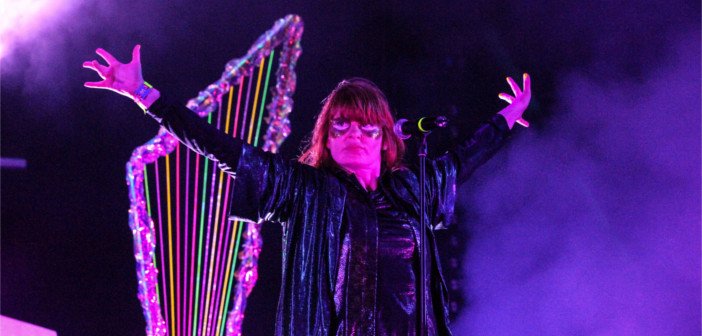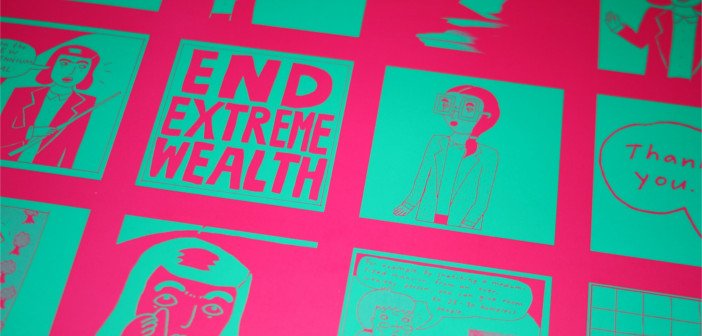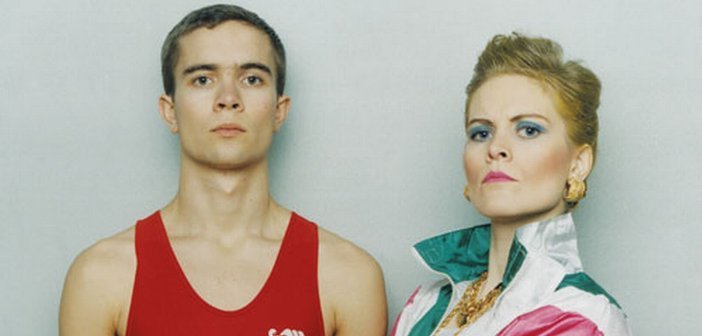They Took My Breath Away: Reflecting on the genius of The Knife
There’s no question that, at least for those of us with predominately American sensibilities, The Knife seemed as foreign in their unashamed liberal politics as they did in their geographical point of origin. Throughout almost all of their music, gender roles and identity are questioned constantly and heavily. Mental health and illness get confronted with zero punches pulled, no flinching in the face of the kind of inner darkness that most of Western society seeks to run from. Racial privilege, activism and sexism are explored in-depth through pointed lyrics and densely crafted soundscapes.
Voices are pitch-shifted so often and so masterfully, vocals layered so constantly that any idea of what constitutes “male” or “female” vocals disappears entirely – just through manipulation of sound, through seemingly simple filtration and mixing techniques, the experimental electronic sibling Swedish duo The Knife managed to create in their music the society that their lyrics and artwork seem to suggest they long for. More extreme and unapologetic in their unusualness than massive indie act Crystal Castles, more icy and singular than Bjork and more indecipherable at times than Radiohead, The Knife managed to accomplish every goal it ever set for itself, and took the listener on a far-left activist-tinged journey that revealed, by the end of it, how surface-level so many of the things we associate with identity really tend to be.
[pullquote]More extreme and unapologetic in their unusualness than massive indie act Crystal Castles, more icy and singular than Bjork and more indecipherable at times than Radiohead[/pullquote]To listen to The Knife elicits many impulses, and these are some of them: The Knife makes you want to dance. The Knife makes you want to cry. The Knife makes you want to hide your face with masks and defy your gender. The Knife makes you want to make signs to hold up at protests against extreme wealth and gender inequality. The Knife seems to go several steps further than almost anyone else in the liberal movement – rather than just advocating for equality amongst the genders, The Knife seems to call for the eradication of gender even meaning anything. It’s an almost asexual band that manages to still be sexy, with seduction and groove regularly injected as-needed. Karin Dreijer Andersson and Olof Dreijer are both talents that seem unmatched in their wheelhouses, able to marry stage performance, theatre, dance, politics and music altogether to form some of the most delightfully strange and unique art to ever come out of the modern electronic scene.
[iframe id=”https://embed.spotify.com/?uri=spotify%3Atrack%3A543YXRm9EjLFYvVcejBTp8"]
Over the course of just four records, The Knife show a progression both in talent and ideology that seems to guide the listener towards their end-goal, each one building higher than the last. When you start with their self-titled, you hear an interesting yet unrefined act that could go nowhere fast but has talent, only to move onto Deep Cuts and hear a socially-conscious and icy synthpop act that manages to instill electricity through their cold detachment, somehow able to sound almost wholly removed and yet be emotionally swelling in a powerful and confusing way.
There is an emotional warmth that creates a sense of artistic irony which clashes beautifully with the distant tone to so much of what you hear. Whereas someone like Thom Yorke pushes his voice as far out as possible, the sound of a soul revealing itself loudly to reach your ears, Karin Dreijer simply steps back, twists the right knobs and mutes herself entirely, and yet you still feel overwhelmed when you hear a song like ‘Got 2 Let U’, a hard-hitting yet frighteningly groovy track dealing with relationship abuse and neglect.

And where Deep Cuts shows a dark sense of humor, a smirk at the edges of the faces no promo photos let you see – and, really, if you don’t believe me, then give one listen to the almost too-childish-for-its-own-good ‘Hangin’ Out’ – Silent Shout jets into a Nordic darkness immediately and cleanly, all ties to that previously over-the-top comedy almost totally absconded. There’s still some humor to be found, but it’s never as juvenile as anything previously, and it dives into psychology, Jungian symbolism, cabins walled in by snow and nights that don’t end for months at a time without fear.
It is an album where any artistic hesitation seems to have been shed, and what we’re left with is a top-of-their-game pairing of artists working remarkably together. Where Deep Cuts began with the warm and rich ‘Heartbeats’, Silent Shout confronts you with pulsating, vibrating and alien landscapes in which the ego is lost completely – “Yes, in a dream all my teeth fell out; a cracked smile and a silent shout.”
There’s little joy to be found in it, yet in that darkness is a level of seduction that neither of their past albums were able to offer. It’s a thing of perfection, of beauty and dread, confrontational in its magic. From ‘We Share Our Mother’s Health’ on, there’s a stretch of songs that is absolutely intoxicating in their singularity, primal and profound, thoughtful and instinctive. The almost flowery sounds of their past two albums are nowhere to be seen, and even though that style seemed so integral to them before, you don’t miss it when you hear ‘Like a Pen’, a song that confronts body image expectations in society from women, full of lyrically sharp imagery, biting and stabbing, taking flesh away when it meets your neck.
[y[youtube id=”gtdE7yMDdiA”]p>
A song like ‘Still Light’ removes all of the complex layering, the intense walls of production and the schizophrenic pacing and trades it all away for what is something far more haunting in its minimal approach. The Knife’s lyrics are always specific in a way that suggests clear intent while remaining vague enough to allow the listener to project themselves onto them. ‘Still Light’ crafts a haunting narrative set to what can only be described as isolated and lonely whale song of someone waking in a hospital after what is likely an attempted suicide, describing a sense of social pressure and demand to keep things together than anyone who’s been there knows all too intimately. Silent Shout, an album full of eruptive and volcanic ice storms like ‘We Share Our Mother’s Health’, ends instead on a whimper, and it’s all the better for it.
Once you’ve grown truly accustomed to the fiery chill of that record, and feel that they’ve said all they can – attacking misogyny and violence against women, attacking mental health stigmas, attacking gender constructs and rape culture – and you’ve come to identify their distinctive sound as something closer to depression in the Ice Age rather than the blooming and warm electronics of their first two albums – the tribal and haunting Shaking the Habitual destroys all of your ideas of what The Knife is. It’s the sound of a band culminating in every single way possible. It’s a final package, a neatly-wrapped and incredibly sprawling and disturbing epic of a record that comes with a lengthy comic instructing the audience to put an end to extreme wealth, a perfect read to accompany the bizarre and intimidatingly foreign sound-collages that the album is filled with, as Karin openly admits to her biases in full, saying, “We’re telling stories – trust me.”
[p[pullquote]e Knife’s lyrics are always specific in a way that suggests clear intent while remaining vague enough to allow the listener to project themselves onto them[/[/pullquote] live in a culture where conservatism is the norm. What passes for liberalism now is incredibly mild compared to many definitions of the term. The far right has continued to dig in deep and yank the left closer to the right over the years. The Knife, in a sense, feels like an attempt to cure that – if extreme weight’s been placed on one end, then to tip the scales will require something even heavier on the other. In a world where surface-level identity reigns, The Knife with every successive album threatened and challenged that idea as much as possible, shoving out, going further and further beneath the surface to find what waits at the core, and in doing so pushed the listener into an area of far-left politics that even for many liberals might be discomforting.
But it’s proof that, often, discomfort in art can be a very, very necessary thing. Terrifying, detached and menacing vocals on a song like ‘Full of Fire’ threaten to attack the listener, almost, a seething and haunting vibe flowing through from the first second to the very end as Karin goes from seemingly satirical lyrics mocking conservatism to simple, monotone, scary and impacting “ha-ha, ha” laughter that seems as antagonistic as anything recorded before.
[y[youtube id=”DoH6k6eIUS4"]p>
“Let’s talk about gender, baby; let’s talk about you and me,” Karin sings over and over, faster and faster, pitch-shifting vocals turning her voice into more of a machine, something clinical and malfunctioning, than an actual person’s throat. ‘Stay Out Here’ manages to simultaneously seduce and horrify the listener at the very same times, more despondent, detached and totally foreign voices coiling into their ears, a narrative of financial collapse and inequality told more through abstract sound and vocal techniques than lyrics, which, despite their high-quality, rarely seem the center-focus on almost every song found on … Habitual.
It’s a tactic used in most of their work – and I say tactic, not technique, because so often it seems less like The Knife are trying to simply make art and are instead trying to wage a war on whatever injustice has gotten beneath their skin, a complete and perfect marriage of art and ideology. Their music flaunts the idea that art should be separated from politics; nothing is off-limits in their songs, thematically or directly.
Body dysphoria, environmentalism, how it feels to be a liberal in a world crafted by the conservative elite – The Knife created soundtracks to the far-left outsider’s passions, nightmares and dreams in a way no one else ever has. Ending on a song called ‘Ready To Lose’ could not feel more appropriate, a lasting track that speaks of the desire to abandon any privilege one has, to move past inequality and come to a place where we are all simply human. The Knife were ahead of their time in 2013 and they still are now.

Fiercely anti-consumerism, incredibly singular and not remotely concerned with whether or not you “get it,” The Knife were never built for the masses. Their best work continues to seem potent and revolutionary, inventive and challenging still, no matter how much music you listen to. They’re a band that rather than nervously declaring their beliefs proudly proclaimed themselves as far-left idealists who did not stutter and did not hesitate to use their voice however they saw fit.
To listen through their discography from beginning to end is to almost hear a human soul transform, twisting from something young and vulnerable to something towering, strong and defiant. Identity is explored thoroughly and profoundly across their work until you finally hit a point where a song like ‘Old Dreams Waiting to Be Reawakened’ can happen, more odd sounds than anything resembling traditional music, a nightmarish factory-soundtrack of a piece that has any traces of human interaction ripped away. Is it a horror movie film score? Is it just a bunch of random found sounds? Is it just typical ambient drone music, or is that too dismissive? Is it anything from planet Earth at all? Kraftwerk would blush. ‘Networking’ and ‘Fracking Fluid Injection’ all defy easy categorisation, as well, all uniting to create sonic palettes that defy and expand what a song like opener ‘A Tooth for an Eye’ suggests.
Whatever they are, it doesn’t really seem to matter – through an endless and constant stream of experimentation, they managed to marry the organic and the synthetic in a way that is less Trent Reznor and more Throbbing Gristle, something that defies any real sense of typical genre and, yet again, breaks down generic labels and attempts to categorize art and, in turn, expressions of the human spirit, always an art project that seemed devoted to denying any attempt to pigeonhole the human soul.

The more The Knife seemed to depart from social identity and constructs – the more Karin played with her voice, the more their music twisted into something that was simultaneously warm, full of rich and tribal, islander-esque sounds and percussion, and yet distant, detached and terrifyingly inhuman, the more they crafted lyrics that give the greatest manifestos a run for their money – the more they seemed to become a grandiose artistic statement that is unmatched in their sphere. Ending after their most ambitious and sprawling album was almost painful to hear, because it’s always the hardest to say farewell to an artist when they are at their top form – and yet, when you really listen to it, and when you see the accompanying tour in which celebrity, performance, gender and fashion all were placed into a blender and puréed, you can see why they ended – because they said all they wanted to say.
They were an artistic statement that seemed to cross all goalposts set for itself. There was nowhere else for that statement – that statement of shredding typical constructs of identity, of removing all the layers to get down to the unfiltered, uncensored heart of a human being – to go, other than by evaporating completely. To make more music would be to cling to the identity of a band for longer than necessary. To stay “The Knife” would be to stay in an artistic construct of identity. In a strange and atypical way, to not release more music is to, if anything, take the concept as far as it can go.
[pul[pullquote]r music stands as the audio equivalent to a life-changing acid trip, or any other intense psychedelic experience.[/pu[/pullquote]pair offered an incredible look at what was not only an evolution of an artistic project into full confidence and maturity, but what served as a fantastic and brilliant mirror into the society that that project sought to help foster. Through detaching from traditional senses of gender identity, physical persona, celebrity image, untouched vocals and almost any trace of the things we often think of when we think of music and of humanity, they managed to somehow become far more progressive and potently human. By stripping away social layering and detaching as much as possible from the ego, The Knife managed to reveal the soul at the center of every individual, where things like the pitch of your voice have no bearing on who you are, where your wealth and your family don’t have a thing to do with you, where how recognizable your face is to someone else has nothing to do with who you really are.
Their music stands as the audio equivalent to a life-changing acid trip, or any other intense psychedelic experience. They exist as proof that the things our cultures and societies have taught us to see as humanity aren’t necessarily the case, and that beneath all of the social coding and teaching that we are filled with from birth exist incredible artists and living beings capable of deeper feelings, deeper thoughts, deeper nightmares and deeper dreams than anything still treading water at that surface level. Rather than just be political, or just be psychological, or just be catchy musicians, The Knife managed to sustainably balance being all three, multifaceted and incredibly dynamic.
If art is meant to raise questions, then The Knife were some of the finest artists of recent time, constantly questioning societal norms, class systems, gender identity and everything else that would send most musicians spiraling into an incomprehensibly existential dilemma. The Knife took my breath away, managing to intensely explore the human condition and what it means to possess an identity both internally and externally. They left behind a body of work that is both an incredible political and social statement and a challenge to the most open-minded of us, a soundtrack to killing the ego and a lullaby to the vanity of human consciousness. It’s just a shame that so little has come forward since their ending to fill the incredible artistic void that they have left behind.

